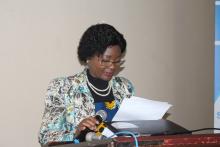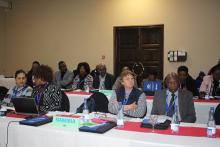The Kingdom of Eswatini hosts the Polio 22nd Inter-Country Certification Committee meeting
The Kingdom of Eswatini hosted the 22nd Inter-Country Certification Committee meeting (ICCC) from 11 to 13 June 2019 at Happy Valley Hotel in Ezulwini. The meeting was attended by representatives from Botswana, Lesotho Namibia, South Africa and Eswatini and members of the Africa Region Certification Committee (ARCC). The meeting launched in 2002 allows countries to support one another to ensure that Polio Eradication and Endgame Strategy is implemented and progress fully documented.
It was noted during the meeting that achievements of the Polio Endgame Strategy are already evident. Wild Polio virus type 3 was declared eradicated in 2015 while type 2 has not been seen since 2012. Type 1 has not yet been interrupted, however, its incidence has been reduced by over 90% since 2014. Worth noting is that only Afghanistan and Pakistan remain endemic to Polio reporting 8 and 21 confirmed cases of type 1 respectively in 2019. The last wild polio virus case was recorded in Nigeria in August 2016. This gives hope for the African region, being polio free for the past three years. The last polio case reported in Eswatini was in 1989, marking exactly 30 years of polio free status. Another issue of concern raised during the meeting was the circulation of vaccine derived polio virus in Mozambique.
Speaking on behalf of the Eswatini Honourable Minister of Health, Dr Vusi Magagula , the Director of Health Services stated that vaccine-preventable diseases claim the lives of more than half a million children younger than 5 years every year in Africa – representing 56% of the global deaths related to vaccine-preventable diseases. The Minister emphasised that immunization is critical to preventing these deaths and helping children everywhere survive and thrive. He noted that Eswatini is performing well in Acute Flaccid Paralysis surveillance. A total of 19 AFP cases were reported in 2018 surpassing the target which is at least 2 cases per 100,000 populations of under 15 years of age. Stool adequacy is at 94% nationally.
The World Health Organization (WHO) Country Representative Dr Cornelia Atsyor noted that as long as Polio transmission is not interrupted in Afghanistan and Pakistan all countries remain at risk of importation of the virus. The vulnerability is more for those countries with weak public health systems, low immunisation coverage with missed children in the delivery of polio vaccines and having travel or trade links with these endemic countries. “Highly sensitive surveillance for acute flaccid paralysis (AFP), including immediate case investigation, and specimen collection are critical for the detection of wild poliovirus circulation with the ultimate objective of polio eradication. AFP surveillance is also critical for documenting the absence of poliovirus circulation for polio-free certification” said Dr Atsyor. Dr Atsyor urged all the five countries to develop and implement strategies to maintain the polio-free status based on the recommendations of the independent African Polio Certification Commission (ARCC).
This meeting also provided an opportunity for peer review of country progress and update reports for the countries. The meeting came up with 19 recommendations and action points for countries to implement in order to sustain the polio – free status.
Polio is a crippling and potentially fatal infectious disease, which causes irreversible paralysis within hours of infection. There is no cure for this diseases but there are safe and effective vaccines that can prevent one from getting the disease. The strategy to eradicate polio is therefore based on preventing infection by immunizing every child until transmission stops and the world is polio-free. The World Health Organization is ensuring that the region is not left behind in the eradication and elimination efforts, by providing financial and technical support towards achieving these goals.





